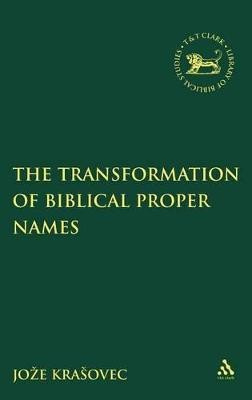The Transformation of Biblical Proper Names(English, Hardcover, Krasovec Joze)
Quick Overview
Product Price Comparison
This book explores the various transformations of biblical proper names. The basic phonetic relationship between Semitic languages on the one hand and non-Semitic languages, like Greek and Latin, on the other hand, is so complex that it was hardly possible to establish a unified tradition in writing biblical proper names within the Greek and Latin cultures. In the transmission we encounter various transformations of biblical proper names. The basic phonetic relationship between Semitic languages on the one hand and non-Semitic languages, like Greek and Latin, on the other hand, is so complex that it was hardly possible to establish a unified tradition in writing biblical proper names within the Greek and Latin cultures. Since the Greek and Latin alphabets are inadequate for transliteration of Semitic languages, authors of "Greek and Latin Bibles" were utter grammatical and cultural innovators. In "Greek and Latin Bibles" we note an almost embarrassing number of phonetic variants of proper names.A survey of ancient "Greek and Latin Bible" translations allows one to trace the boundary between the phonetic transliterations that are justified within Semitic, Greek, and Latin linguistic rules, and those forms that transgress linguistic rules. The forms of biblical proper names are much more stable and consistent in the Hebrew Bible than in Greek, Latin and other ancient Bible translations. The inexhaustible wealth of variant pronunciations of the same proper names in Greek and Latin translations indicate that Greek and Latin translators and copyists were in general not fluent in Hebrew and did therefore not have sufficient support in a living Hebrew phonetic context. This state affects personal names of rare use to a far greater extent than the geographical names, whose forms are expressed in the oral tradition by a larger circle of the population. Over the last 30 years this pioneering series has established an unrivaled reputation for cutting-edge international scholarship in Biblical Studies and has attracted leading authors and editors in the field.The series takes many original and creative approaches to its subjects, including innovative work from historical and theological perspectives, social-scientific and literary theory, and more recent developments in cultural studies and reception history.


